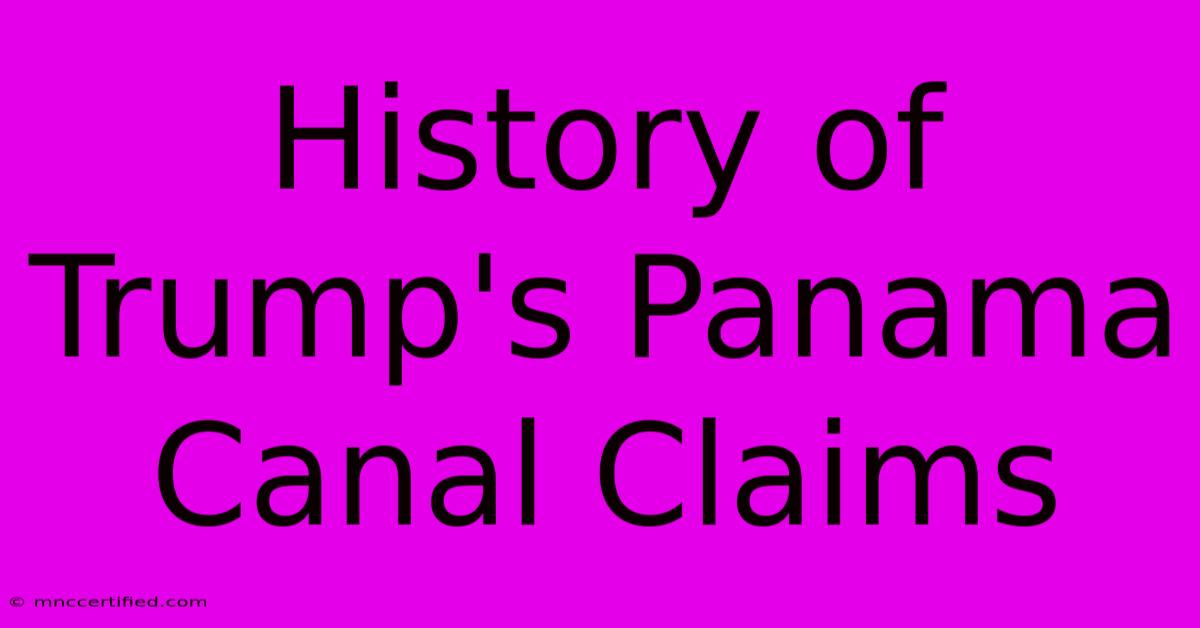History Of Trump's Panama Canal Claims

Table of Contents
The Curious Case of Trump's Panama Canal Claims: A Historical Deep Dive
Donald Trump's pronouncements regarding the Panama Canal have often been… unconventional, to say the least. Understanding the history behind these claims requires separating fact from fiction and examining the context surrounding his statements. This article delves into the evolution of Trump's assertions about the canal, exploring their accuracy and the broader implications.
Trump's Assertions: A Summary
Throughout his presidency and beyond, Trump made various claims related to the Panama Canal, often intertwining them with narratives of American exceptionalism and economic dominance. While specific statements varied, common themes included:
- American Ownership/Control: Trump frequently implied, or directly stated, that the U.S. should have greater control or ownership of the Panama Canal. This often lacked historical context and nuanced understanding of the canal's treaty-based governance.
- Infrastructure Neglect: He sometimes suggested the canal was in disrepair due to mismanagement, again lacking specific evidence or detailed analysis.
- Economic Advantage: His claims often focused on the economic benefits the U.S. could gain from stronger control, suggesting significant untapped potential for American businesses.
These statements, however, frequently lacked concrete evidence and often clashed with the established history and current operational realities of the Panama Canal.
The Historical Reality: From Construction to Transfer
The Panama Canal's history is complex and fascinating. Its construction, a monumental feat of engineering in the early 20th century, was fraught with challenges, including disease, logistical hurdles, and political maneuvering.
American Involvement: A Legacy of Control
The United States played a pivotal role in the canal's construction, taking over from a struggling French company. The Hay-Bunau-Varilla Treaty of 1903 granted the U.S. control over the Canal Zone, a strip of land across Panama. This period saw significant American investment and control, solidifying the U.S.'s strategic influence in the region.
The Torrijos-Carter Treaties: A Shift in Power
However, the relationship shifted significantly with the Torrijos-Carter Treaties of 1977. These treaties, signed by Panamanian dictator Omar Torrijos and President Jimmy Carter, established a timetable for the transfer of control of the canal to Panama. This transfer was completed on December 31, 1999, marking a significant moment in Panamanian history and reshaping the geopolitical landscape of the region.
Deconstructing Trump's Claims: Fact vs. Fiction
Many of Trump's statements regarding the Panama Canal lack factual grounding when compared to the historical record and current operational realities.
- Ownership Claims: The U.S. no longer owns or controls the Panama Canal. Panama holds full sovereignty, and the Panama Canal Authority manages its operations.
- Infrastructure Claims: While maintenance and upgrades are ongoing, suggesting widespread neglect is inaccurate. The canal remains a vital and efficiently run waterway.
- Economic Advantage Claims: While the canal's economic importance is undeniable, suggesting the U.S. is missing out on massive potential due to lack of control ignores the complex economic realities and the existing cooperative relationships between Panama and various international players.
The Political Context
Understanding Trump's statements requires considering the broader political context. His pronouncements often served to reinforce his nationalist agenda, portraying the U.S. as unfairly disadvantaged and needing to reclaim its dominance on the world stage. This narrative appealed to his base, but it frequently disregarded historical nuance and factual accuracy.
Conclusion: Separating Rhetoric from Reality
Trump's assertions about the Panama Canal often veered into unsubstantiated claims, neglecting the historical context of the canal's construction, transfer of control, and current operational status. While understanding the political motivations behind these statements is important, it's crucial to rely on accurate historical information and unbiased analyses to form informed opinions on the complex issues surrounding the Panama Canal. The canal's history is a testament to both engineering prowess and evolving geopolitical dynamics, a narrative far richer and more nuanced than any single, simplistic assertion can convey.

Thank you for visiting our website wich cover about History Of Trump's Panama Canal Claims. We hope the information provided has been useful to you. Feel free to contact us if you have any questions or need further assistance. See you next time and dont miss to bookmark.
Featured Posts
-
Madrid 4 2 Sevilla Match Analysis Dec 22
Dec 23, 2024
-
Navy Pilots Red Sea Crash Friendly Fire
Dec 23, 2024
-
Jalen Hurts Misses Commanders Game Concussion
Dec 23, 2024
-
Season Ends Cardinals Eliminated
Dec 23, 2024
-
0 0 Draw Fulham Vs Southampton Analysis
Dec 23, 2024